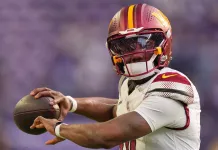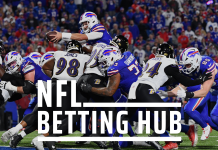Do you remember when Jerry Seinfeld was leaving Monk’s after having a conversation with George Costanza, and George reminds him: Just remember, it isn’t a lie if you believe it.” Those words of wisdom from George are powerful when it applies to NFL teams evaluating themselves. It’s human nature to lie to yourself and believe it. Teams don’t want to admit they are not settled at a position, even when the evidence suggests otherwise. They cling to a lie and believe it.
Yesterday, I tweeted the raw passing numbers of two quarterbacks, both from the 2021 draft and both 24 years old.
Davis Mills: 28 games (26 starts), 5,782 yards, 33 touchdowns and 25 interceptions, 63.6 % completions and 62 sacks. His team is 5-19-1 in his starts.
Justin Fields: 27 games (25 starts), 4,112 yards, 24 touchdowns and 21 interceptions, 59.7% completions and 91 sacks. His team is 5-20 in his starts.
The initial brushback from this comparison centered on my ignoring the rushing stats of Fields—which he does magnificently. Fields has carried the ball 232 times in two seasons for 1563 yards, scoring ten touchdowns, and averaged 6.7 per carry. He averaged 8.6 carries per game and has fumbled 28 times in his 27 appearances. The intent of the comparison was to show both quarterbacks cannot throw the ball well enough to win. Both players play on talent-deficient teams and haven’t improved over two seasons. The biggest difference is one team admits they need to improve at the position, the other thinks they have found their “man.” How is that possible?
The media is all aboard the Fields train—loving his play and believing he will win the MVP next season. Some have gone as far as believing he is one of the best quarterbacks in the NFC right now. Don’t ask me how they believe that, but they do. What are they watching? Perception is a powerful tool, providing teams with an escape hatch to avoid any criticism. The Texans are getting killed for not taking a quarterback, while the Bears are being applauded. George is right, a lie isn’t a lie if you believe it. And clearly, the Bears and the media believe in Fields.
What has made the difference for those who love Fields and dislike Mills? Well, for one, their draft status. Do you believe anyone would be behind Fields if he wasn’t a first-round pick? Let’s say Fields was a seventh-rounder from a small school who dominated his level of play, demonstrating superior athletic skills. He would have never received 27 starts nor would there be a level of patience toward development. He would quickly be labeled an athlete with marginal passing skills. Since he was a first-round pick and played well at a high level in college, he gets more opportunities to demonstrate his skill set, which he earned from his college play. But how many more opportunities? At what point does the draft status vanish?
The NFL draft system is backward in terms of evaluation. We value a player’s draft status more than how he plays when it doesn’t matter where they get picked. It only matters how they play. All we talk about is the round a player is selected when once the draft is over, talent is the only factor, and performance on the field is all that matters. Proof of play is the only commodity to value.
Another factor pushing the love towards Fields is his WOW plays. Fields is an amazing athlete with great speed and when the ball is in his hands, two things can happen—a big run, or a chance of a fumble. No one ever mentions Fields averages one fumble a game during his NFL career, which isn’t a good thing. People fall in love with his running skills, his speed, and his ability to break tackles. Even though those plays don’t reflect in helping his team win games.
Winning is what quarterbacks must do, and when a quarterback turns the ball over 21 times on interceptions in 27 games and fumbles 28 times, the margin for his winning games is laser thin. In addition to the turnovers, Fields has been sacked 91 times—yes, 91 times, and has lost 623 yards for an average of 6.84 yards lost on each sack. Is Fields helping the Bears win when he cannot hold onto the ball, throws 21 interceptions, gets sacked 13.4% of the time on his throws and loses on average 6.84 yards? Let’s be honest, he isn’t helping the Bears; he is hurting them as Mills hurts the Texans. But don’t forget, the Bears are all set at QB, and the Texans aren’t.
You might claim it isn’t fair to place the burden on winning on either Fields or Mills. Well, great players often show their skills to help teams win early in their careers. For example, when Lamar Jackson took over the starting job in Baltimore, his rookie season his team was 4-5, and he won six of the next seven games, and he got the Ravens into the playoffs. A great quarterback can win games for his team, and both Mills and Fields haven’t been great. Yes, Fields makes WOW plays, but he doesn’t make plays to win the game. Go ahead. Make excuses. Claim he will get better like Jalen Hurts improved. But once again, Hurts won nine games in his second season. Where is the evidence that Fields is going to improve and Mills won’t?
Can Fields improve? At his current level of play, improving should not be hard. Yet, that is not the real question to ask. The only relevant question is, can Fields help the Bears win a title? Can he become a top-ten player at his position in the league? The same questions apply to Mills, and you have the answer quickly. Why is answering for Fields so hard? Because for one we believe the lie, for the other, we don’t.





